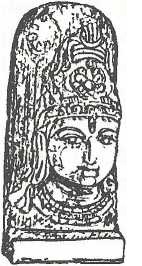Ekamukhalinga
From Hindupedia, the Hindu Encyclopedia
By Swami Harshananda
Ekamukhalinga literally means ‘one-faced liṅga’.
Śiva is the god of dissolution of the Trinity. He is worshiped invariably in the form of liṅga or an emblem of rounded surface. One of the several varieties of liṅgas is the mānuṣaliṅga. It is a liṅga prepared by human beings as per the directions given in the Āgamas like Ajitāgama and Supra-bhedāgama.
In the mukhaliṅga of this variety, one or more mukhas or faces of Śiva are carved on the pujābhāga.[1] If there is only one mukha, then it is called ‘eka-mukhaliṅga’. It is carved on the round pujābhāga facing the main door of the shrine. It occupies 120 degrees of space. Its height should be more than one hasta or tāla but less than five tālas.
References[edit]
- The Concise Encyclopedia of Hinduism, Swami Harshananda, Ram Krishna Math, Bangalore

